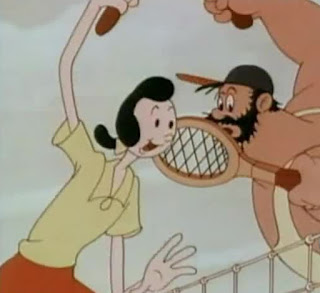By Michael Lyons
It’s the Dog Days of Summer. It’s also the Cat Days, Mouse Days, Duck Days and even Popeye Days of summer!
As we find ourselves in the midst of this hot, hazy and humid season of bar-b-ques, summer camps, beaches and vacations, a great way to mark all that summer has to offer is to turn back the clock to a time when cartoon short subjects were part of a night at the movie theater.
In the Golden Age of Hollywood Studio animation, cartoon characters who were stars of these shorts, found themselves in a variety of seasons and settings, including summer.
Watching these summer-themed cartoons, in all of their 2-D, traditional animation glory, there’s not just a sense of innocence for a time gone by, but of all the glory that the season of summer holds.
Hawaiian Holiday (Disney, 1937)
A very iconic cartoon short from Disney that stars the Studio’s “Fab Five:” Mickey Mouse, Minnie Mouse, Donald Duck, Goofy & Pluto, all together on vacation in Hawaii.
Directed by Studio veteran Ben Sharpsteen, the short has lush background design, as well as great animation of the characters at their most classically iconic. It also features brilliant sight gags, such as Goofy battling a wave while surfing and getting “flung” to shore and Pluto fighting with a crab, with some painful results.
All of “Hawaiian Holiday” is SO classically Disney, from look to design to music that the short is as warm, comfortable and welcoming as vacation itself.
Vacation with Play (Famous Studios, 1951)
Popeye the Sailor and his girlfriend Olive Oyl embark on a resort vacation. Popeye wants to relax and sleep, while Olive wants to take part in some of the resort’s activities.
Soon, Olive finds herself pursued by the Resort’s Activity Director, played by, you guessed it, Bluto. Popeye is soon iterally battling Bluto for Olive’s affections. After downing a can of Spinach and fighting to “the finach,” Popeye defeats Bluto and wins Olive back.
Not as strong as many short subjects of the time, “Vacation with Play” features some amped up “cartoon violence,” when Popeye and Bluto go at it (Popeye is literally knocked out and sent flying back into his hammock).
Still all the now iconic trademarks of a Popeye short are there, coupled with a cartoon glimpse of what resort vacationing looked like about 60 years ago. It’s a quaint, nostalgic look at summers past.
Muscle Tussle (Warner Bros., 1953)
Daffy Duck takes his girlfriend to the beach, only to have words with a musclebound duck. Daffy wises off to the mammoth mallard, who tells Daffy that he will knock his “head so far down between your little old shoulders, you’ll have to unbutton your vest to eat!”
Daffy proceeds to get pummeled and his girl leaves with the muscular duck. Daffy then attempts to win his girlfriend back by purchasing a questionable muscle tonic...which has disastrous and funny results.
Warner Bros. Animation legend Robert McKimson brings his ingenious, quiet comedic style to this short. When Daffy’s girlfriend calls him a 9-lb weakling, Daffy retorts, “How do you like that? Calling me a scrawny little 9-lb weakling, when it’s perfectly obvious I’m a scrawny little 10-lb weakling!”
There’s also fun character design, particularly in the ridiculous looking bodybuilding bully of a duck.
As with many Warner Bros. Shorts, this one also skewers popular culture, as it seems to be poking fun at ads at the time promoting “Charles Atlas body building books,” which included a comic strip featuring a skinny “wimp,” at the beach getting sand kicked in his face. Obviously, one of the many summer dangers of the time!
Barbeque Brawl (MGM, 1956)
One of MGM’s Studio’s wide screen Cinemascope cartoons, this Tom and Jerry offering centers on the bulldog father and son Spike and Tyke, who are settling in for a backyard barbecue, when they are interrupted by the cat and mouse chasing antics of Tom & Jerry.
What follows is what one would expect with Jerry outsmarting Tom and Tom getting in the way of Spike and Tyke’s barbecue (to Spike’s fury).
What sets this cartoon apart is how stylized the backgrounds are, obviously influenced by both the UPA Studio and television animation, that was on the rise in the ‘50’s. The imperfect, crooked lines and colors, so prevalent in animation at the time, adds a note of nostalgia to the proceedings.
Also, it’s nice to reflect back on a time when charcoal briquettes were a part of barbecuing and an army of ants was a mainstay of any cartoon picnic.
All of these cartoon shorts are a nice reminder of a time when animation was a prevalent part of major Hollywood Studios and the regular moviegoing experience.
That silver screen era has faded like the last days of summer itself. However, thanks to the filmmakers who brought us these shorts, we can celebrate summer with our favorite cartoon stars and enjoy all that the sunshine season brings our way.
Sources:
Boomerang
IMDb
Wikipedia












